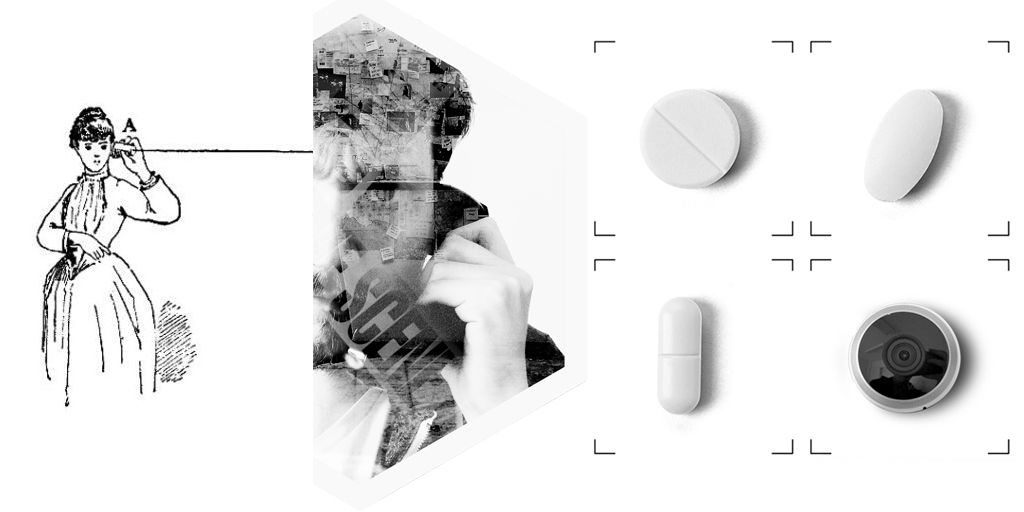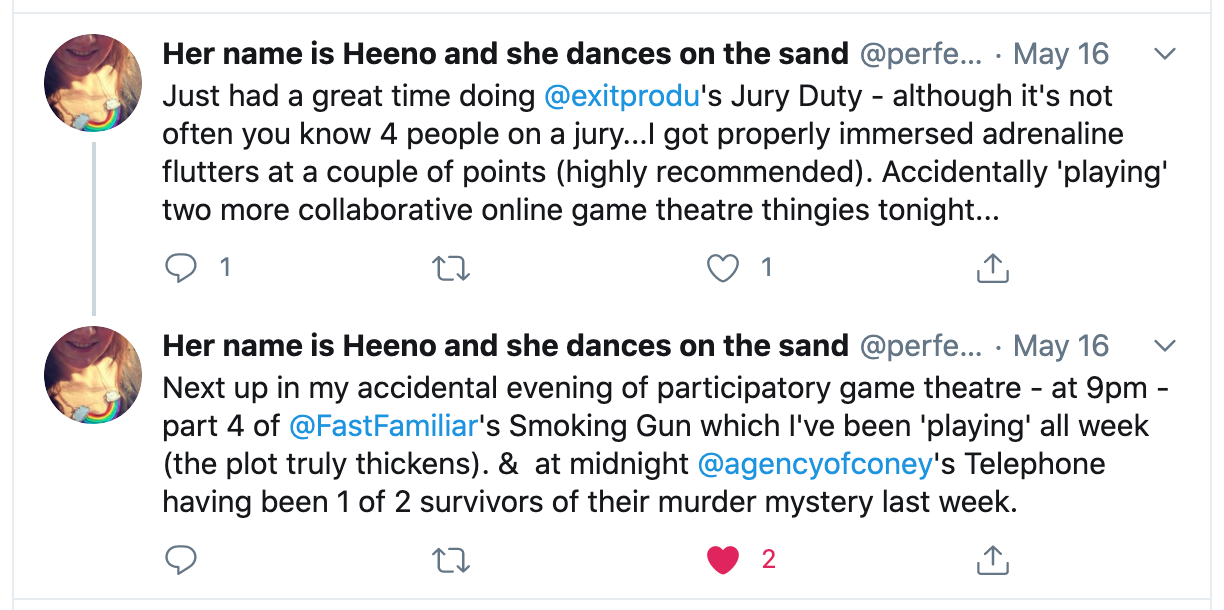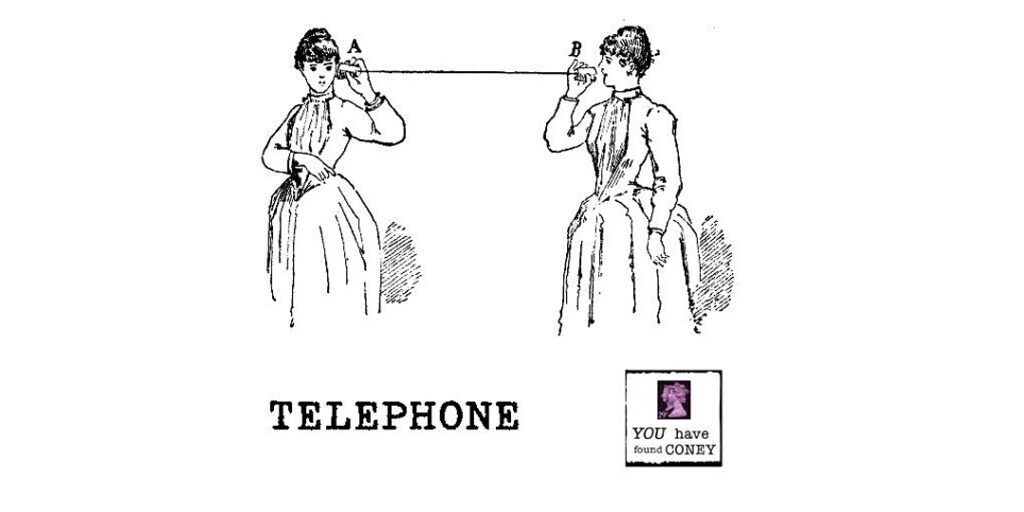New forms, old boxes
So theatres are shut - I don’t know if you’d noticed. Some people are making for a new architecture - the internet. But do we have the language to talk about these new forms?

So theatres are shut - I don’t know if you’d noticed.
And while some organisations have been releasing archive recordings of performances taking place on their stages, other people are making for a new architecture - the internet. This piece is a reflection on being a maker and an audience member in this new space, and a call for a more nuanced language for these emerging genres, so that we can serve audiences better.
The structure (I’m talking physical structure here, let’s not get into the other stuff) of theatres indicates the role of the audience. The audience are usually separate from where the performance takes place. There are seats for them, often in rows, orientated towards where the performance will happen. There are fewer lights for the space where the audience are than for the performance space. Of course there are exceptions to this rule, but in general, the architecture of theatre suggests that audiences should sit, apart from the performance rather than within it, and direct their attention to the performance, not the people seated near them. The architecture of theatres invites watching, listening and thinking (in which I’m including feeling, empathising, imagining etc.) The stories you encounter when going to the theatre can be wildly different but the behaviour asked of you is roughly the same whether it’s Hamlet, Hamilton or Fleabag.
But now we’re making for the internet. And the architecture of the internet is more varied. What you ask of the audience will be shaped by the platform you use - and if you want something that doesn’t exist yet, you build your own platform. So the emergent forms of ‘digital performance’ or ‘digital story-telling’ are exactly that - different forms, plural - and the better we get at articulating that, the better we serve audiences - by giving them accurate expectations and the option to say ‘I don’t think that one is for me.’

In the past couple of weeks we’ve been tagged in tweets alongside a couple of other online projects - Coney’s Telephone, Exit Productions’ Jury Duty and Machina X’s Lockdown (and Fast Familiar’s project is Smoking Gun). In some ways, these projects do ‘belong’ together - all provide an alternative to pre-recorded theatre performances - but they are completely different to each other.*

I also want to talk about expectations. When we buy a ticket for something we have an idea about what it’ll be like - that was probably what caused us to buy the ticket. When I book for Coney’s Telephone, I expect it’ll be somehow playable. I expect this because of Coney shows I’ve done in the past, where I’ve had to make choices or take actions. I don’t remember the copy for Telephone. In truth, I probably didn’t read it carefully but just booked because I like the company. What I’m saying is that those expectations are on me, not down to anything Coney have actively done.
Telephone is a gentle story-telling piece hosted by Tassos Stevens on Zoom. For me, the heart of it is a moving story about someone that Tassos has never met, but who is present in his life in a number of different ways. We, as the audience, play a game of requesting different ‘phone numbers’ to prompt Tassos to share episodes about that and other stories. The atmosphere is intimate and we don’t have to do anything we don’t feel comfortable with. We can turn our screens off if we want and no one is compelled to request a phone number. For the vast majority of the piece, we don’t really interact with other players, certainly not without Tassos’ mediation. We are guided by Tassos for 90% of the 90 minutes of duration.
I can imagine Telephone as a face to face performance: Zoom brings us together and the piece references the medium in different ways, but I don’t think there is anything in the piece that wouldn’t work equally well in a theatre… there are moments during it when I think about Chris Thorpe and Hannah Jane Walker’s performance piece I Wish I Was Lonely. I have an enjoyable evening. I also remind myself of something that dramaturg Purni Morrell once said to me, that when watching a piece of performance the only two questions you should be asking yourself are:
- What is happening?
- How do I feel?
There isn’t a number 3 which is how ‘does the show the artist made compare to the one I thought they might?’ Or number 4: ‘how comfortably does this fit into the genre box of ‘theatre’ or even ‘online performance’?

I book for Exit Productions’ Jury Duty with slight trepidation. In 2018, we made a jury show and will release its sequel in July. I want this to be sufficiently different to what we have made. It turns out that I shouldn’t have worried - although here players are nominally a jury deciding on whether he did it or not, the way a verdict is reached is through following clues and solving puzzles rather than deliberation. Like Telephone, Jury Duty also uses Zoom, along with a series of other non-Zoom located pieces of evidence. We work in video-chat groups, initially 6 and then the full 12, perusing evidence and discussing. A moderator lurks in the Zoom room but it’s each other that we’re talking to - or sadly, being talked at by… I have the bad luck to be in a group with a man who lives his best life by taking up all the space and telling people what to do. I end up in a private Whatsapp chat with the two friends I have playing, and we work together as a sub-cell to avoid domination by Mr Loud.
It’s interesting as many of the tasks - cracking ‘codes’, cross-referencing pieces of evidence, spotting anomalies - feel like the territory of online ‘escape rooms’. The online escape room has activities similar to what you might have got in a physical escape room pre-Plague but the frame narrative is not about escape - and more often about catching a bad guy (in the past few weeks, I’ve recovered priceless artworks, thwarted the mafia, and prevented a major heist). A difference between these and Jury Duty is that you buy a group ticket for escape rooms and play with your pre-existing group of friends… which hopefully means no dominating arseholes**. It’s interesting trying to solve a puzzle with a group of strangers, in a format that the loudest voices can dominate. When we’re discussing as a group of 12, two men do most of the talking while I and a couple of others use the written chat function to work through the evidence. Which is quite satisfying.

In Jury Duty, we’re guiding ourselves perhaps 70% of the time, but regular check-ins from our moderator and the ticking clock maintain a tight direction of travel. In pretty much every way apart from the fact that both use Zoom, Jury Duty differs from Telephone. Neither is more ‘bad’ or ‘good’ but they are not the same thing - or even same family of things if you look from the perspective of what the audience is being asked to do. Sure, both are ‘online stories’ but that’s where the similarity ends. Which is great, because not everyone wants the same thing.
And then our thing, Smoking Gun. It’s long-form, taking place over a week. You work in a group but it’s by text - you never see each other and you can use a fake name so no one need ever know anything about you. You’re solving a puzzle but it’s more of a real-world one than what you’d usually find in an escape room. It runs via an app that we built because we couldn’t find an existing platform that could do what we needed. You and your group are guiding yourselves 90% of the time. It’s not theatre, but because we used to make theatre, some people played our first run with this expectation. While some players delighted in exploring the online world, others wanted to be led a little more. Now we’re selling run 2, we’ve added some info about the nature of the experience. The last thing I want is for someone to buy a ticket for Smoking Gun thinking it’s one thing - and for them to end up disappointed.

So, as the range of ‘online experiences’ grows, what can we do to talk about them more accurately? This isn’t a navel-gazing in-sector preoccupation, it’s about helping audiences. People are actively looking for entertainment during lockdown - so we should be helping them find what they want. Developing this vocabulary means we have to go beyond theatre’s obsession with generic liveness - all these things are live but that’s not the most interesting thing about them. It also means we have to ditch the snobbery that still pervades around games - that they’re somehow less of an art form than theatre or dance or literature. Because, if we don’t get better at describing our work, we’re at the mercy of people’s expectations and I don’t think anyone wins from that.
It’s not about giving the story away, it’s about letting people know what will be asked of them - a bit like content warnings for but for form. This is an access question. Talking to strangers on a video call isn’t something that’s easy for everyone - people might want to psychologically prepare, or at least move the clothes dryer with their pants on it out of shot. There are also big questions for us as makers about how we care for audiences with whom we don’t share physical space (but that’s for another time).
There’s a lot to think about right now, and I’m not saying that developing a taxonomy of online entertainment should be number one priority. But it could benefit audiences and build the kind of critical community around ‘box-defying’ work that we lacked pre-COVID. In the meantime, book for Telephone, book for Jury Duty, book for Smoking Gun because with this sort of work, most of the learning happens once there’s an audience.
And if anyone wants to continue this conversation, publicly or otherwise, please get in touch. The future needs to be polyphonic.

*I haven’t done Machina X’s Lockdown because my German isn’t good enough.
**Tom from Exit Productions kindly got in touch to say that Jury Duty can also be booked as an experience for a pre-existing group, and that half their bookings come that way.

